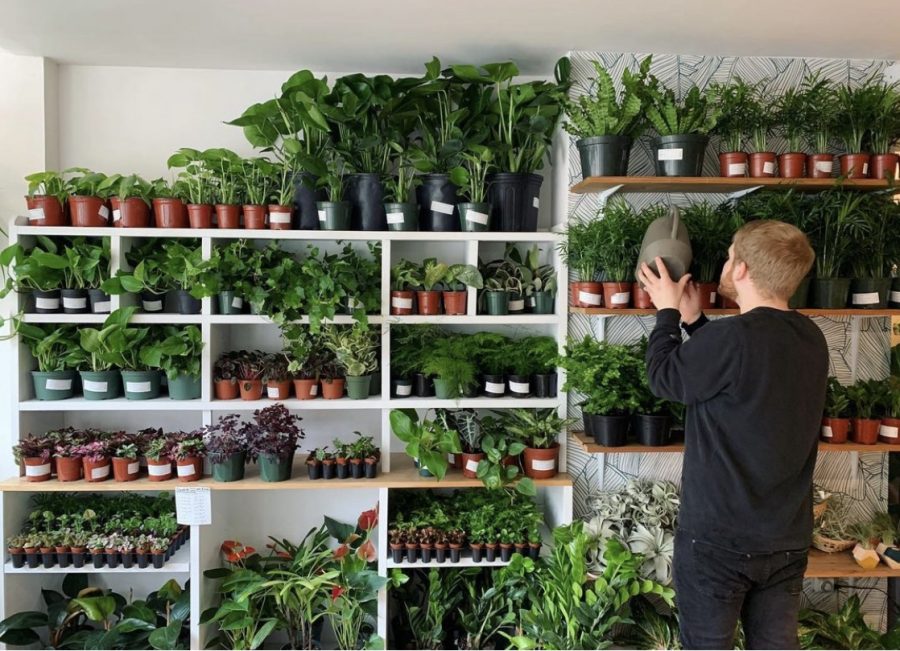Boston small businesses adapt to COVID-19 restrictions, prepare for the holidays
Niche is a plant store with locations in South End and Davis Square.
December 22, 2020
Still looking for last-minute holiday gift ideas? This holiday season, consider supporting some of those who have been hit the hardest by COVID-19 — small businesses.
From clothing to home goods, local Boston businesses both old and new have taken to the internet to continue offering their goods and services.
Many new businesses have sprung up out of needs brought on by the pandemic. New England Doorstep Market, a virtual platform for Boston artisans and farmers to interact with and find new customers, was one of them. It offers products for the adventurous at-home foodie, ranging from fresh honey to ceramic cookware.
“Doorstep Market was launched in response to what we saw as a huge need for people trying to figure out where they could get food,” said Chris Blackburn, founder of the New England branch of Doorstep Market.
Blackburn is an editor for the magazine Edible Boston, and he said he worked with several other editors across the country to make platforms for local makers who had lost their normal sources of outreach, like farmers’ markets. He also started Doorstep Market in lieu of traditional markets, ultimately functioning as an online marketplace for small creators.
Similarly, the clothing company 195Essential is a Black-owned business co-founded by Lena Harris and her father Jason with the intention of helping the local community. She and her father work together with artists to design meaningful shirts and donate to various charities and organizations.
“We wanted to support people and causes that were helping others through this pandemic,” Harris said. “With the resurgence of the Black Lives Matter movement, a lot of people were looking to support Black-owned businesses and women-owned businesses.”
For difficult products to ship, like plants and other delicates, existing small businesses had to think of innovative ways to move online. At the start of the pandemic, plant store Niche closed its brick-and-mortar stores and moved entirely online.
“For us, it was most difficult because we have two stores, so we had to figure out how to coordinate between [them],” said owner Lindsey Swett.
Niche currently offers online orders for in-store pick up of plants at both their South End and Davis Square locations, as well as in-person shopping with reduced hours.
Other small business owners were fortunate enough to have an established online platform already, such as Laurel Greenfield, the artist behind Laurel Greenfield Art.
“I had already started putting art online, and had focused on growing the following online and talking to people online,” she said.
Greenfield said that she has expanded into offering workshops and courses online and exploring other product options through platforms such as Etsy and Society6. While she used to teach art in person at local markets and other events, Greenfield created a series of online courses designed to help both beginners and more experienced art students with improving their work and discovering their style.
The necessity of shopping online during COVID-19 helped many similar small online businesses.
“At the beginning of quarantine, sales and online engagement definitely went up,” Greenfield said.
Despite their successes in establishing online businesses, small businesses like 195Essential continue to face struggles. Wholesale warehouses have been hard-hit by limits on the number of workers allowed, which impacts the small businesses they supply.
“There are definitely some problems that wouldn’t normally happen if we weren’t in a pandemic, such as T-shirt shortages,” Harris said.
Swett, owner of Niche, echoed Harris’ sentiments.
“COVID is raging in Florida — most of our plants come from Florida — so the growers were having a lot of trouble just meeting the demands,” Swett said.
Markets, which are usually so important for local businesses to spread and meet new people, have been almost entirely shut down.
“Usually I do in-person holiday markets, and those aren’t happening this year, so it’s been a little bit more difficult to make holiday sales,” Greenfield said.
The markets that haven’t shut down have added safety precautions. Black Owned Bos., a group founded to promote Black-owned small businesses, has hosted several markets since the summer, including a Seaport market and holiday markets.
“Being able to do the holiday markets was really incredible; we had a lot of business in the two days we were able to do it,” said Harris, who participated in a Black Owned Bos. holiday market.
As the holiday season ramps up, stores like Niche and others are preparing for the increase in sales, and thanks to social media, they have been able to broaden their business to new customers.
“It’s been really amazing to see how much we can get our name out there by only using social media in the time that we live in right now,” Harris said.
Despite all the difficulties COVID-19 has presented, small business owners like Harris, Blackburn and others were able to find ways to make them work.
“I think it’s because customers like stepping up for small businesses,” Swett said.







